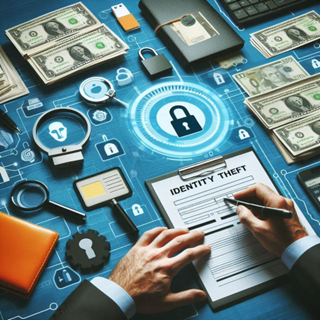What Is Identity Theft?
Identity theft occurs when someone wrongfully obtains and uses another person's personal data in a fraudulent or deceptive manner, usually for financial gain or to commit other crimes. The impact on individuals can be devastating, both financially and emotionally.

A few things to consider about identity theft:
- Financial Loss: Identity theft can result in unauthorized charges on credit cards, unauthorized withdrawals from bank accounts, and even the opening of new accounts or lines of credit in the victim's name. This can lead to significant financial losses and damage to credit scores.
- Emotional Distress: Discovering that one's identity has been stolen can be incredibly distressing. Victims may feel violated, vulnerable, and anxious about their financial security and personal information.
- Legal Issues: Resolving identity theft can be a lengthy and complicated process. Victims often have to deal with law enforcement, financial institutions, and credit reporting agencies to clear their names and repair the damage done to their credit histories.
- Reputational Damage: In some cases, identity theft can lead to reputational damage if the thief uses the victim's identity to commit crimes or engage in other unethical behavior.
In exploring the ramifications of identity theft, the contrasting stories of Frank Abagnale and Michelle Brown offer vivid illustrations of its far-reaching consequences. Frank Abagnale's audacious exploits in the 1960s, where he assumed various false identities to orchestrate elaborate financial scams, underscore the sheer audacity and sophistication of identity theft. His actions not only inflicted substantial financial losses but also eroded trust in institutional systems. Conversely, Michelle Brown's harrowing ordeal serves as a poignant reminder of the devastating personal toll inflicted by identity theft. Through no fault of her own, Brown found herself ensnared in a web of deceit when her identity was hijacked to amass exorbitant debts. The ensuing legal and financial quagmire she faced underscores the arduous journey that victims often endure in reclaiming their lives.
While it's impossible to completely eliminate the risk of identity theft, there are steps individuals can take to protect themselves, including:
- Monitor Financial Accounts: Regularly review bank and credit card statements for any unauthorized transactions.
- Use Strong Passwords: Create unique, complex passwords for online accounts and practice a good password hygiene.
- Secure Personal Information: Be cautious about sharing sensitive personal information, both online and offline, and only provide it to trusted sources.
- Be Wary of Phishing Attempts: Be skeptical of unsolicited emails, phone calls, or text messages requesting personal information and avoid clicking on suspicious links or attachments.
- Monitor Credit Reports: Check credit reports regularly for any unusual activity or accounts that you don't recognize.
- Consider Identity Theft Protection Services: Some companies offer services that can help monitor for suspicious activity and provide assistance in the event of identity theft.
Popular Identity Theft Solutions
Here's a list of some of the most popular identity theft solutions (in the USA), along with a brief description of each:
- LifeLock: A Norton company, offers comprehensive identity theft protection services, including credit monitoring, identity theft alerts, and restoration services. It also provides up to $1 million in coverage for lawyers and experts if you become a victim of identity theft.
- IdentityForce: Offers advanced identity theft protection with features like credit monitoring, dark web monitoring, and real-time alerts. They also provide identity restoration services and insurance coverage to help recover from identity theft.
- Experian IdentityWorks: Provides credit monitoring and identity theft protection services, including dark web surveillance, identity restoration, and up to $1 million in identity theft insurance. They also offer FICO score tracking as part of their service.
- IdentityGuard: Uses artificial intelligence to monitor and alert users about potential identity threats. It offers a variety of protection plans, including credit monitoring, risk management, and identity theft recovery services.
- PrivacyGuard: Provides identity theft protection along with credit monitoring services. Their services include dark web surveillance, identity theft alerts, and up to $1 million in identity theft insurance.
- myFICO: Created by the company that developed the FICO credit score, offers identity theft protection and credit monitoring services. It provides monthly access to FICO scores, credit report monitoring, and identity theft insurance.
- IDShield: provides identity theft protection and monitoring, offering 24/7 support for identity restoration, credit monitoring, and alerts. It also provides consultation services and up to $1 million in coverage for identity theft recovery.
- Zander Insurance Identity Theft Protection: Offers identity theft protection focused on restoration services rather than credit monitoring. They provide assistance in recovering from identity theft, with up to $1 million in coverage for expenses related to restoring your identity.
- Aura: It's an all-in-one digital security solution that provides identity theft protection, credit monitoring, and online privacy tools. It offers features like identity restoration, financial fraud protection, and dark web monitoring.
- Allstate Identity Protection (formerly InfoArmor): Offers comprehensive identity theft protection, including social media monitoring, credit monitoring, and dark web surveillance. They also provide a proactive alert system and identity restoration services.
- IdentityIQ: Provides identity theft protection and credit monitoring with daily credit report monitoring, dark web surveillance, and identity theft insurance. They also offer identity restoration services to help victims recover.
- Equifax Complete™ Family Plan: This service from Equifax provides credit monitoring, social security number tracking, and alerts for unusual activity. It also includes identity restoration services and insurance coverage.
These services typically offer a combination of credit monitoring, alerts for suspicious activity, dark web surveillance, identity restoration, and insurance coverage to help mitigate the effects of identity theft. The specific features and costs vary, so it's important to choose the service that best fits your needs.
Conclusion
Overall, awareness, vigilance, and taking proactive steps to safeguard personal information are crucial in reducing the risk of identity theft and mitigating its impact if it does occur.


